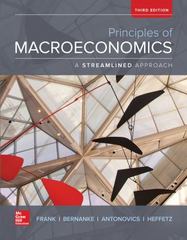Question
#1 Stocks are a risky investment. Treasury bills are highly liquid and risk free investment whose interest income is not subject to state income taxes.
#1 Stocks are a risky investment. Treasury bills are highly liquid and risk free investment whose interest income is not subject to state income taxes. Stocks have significantly outperformed Treasury Bills over the long term. In light of these higher returns, which best explains why an individual would invest in Treasury Bills vs. Stocks?
A. US Treasury Bills are highly liquid; exempt from state and local taxes; and have lower return than stocks
B. Preference for a very low risk investment would result in an individual choosing Treasury Bills over stocks despite lower expected returns.
C. US Treasury Bills are highly liquid and exempt from state taxes.
D. The individual may not want higher returns associated with stocks. E. Stocks are riskier than Treasury Bills.
#2 Which of the following statements is FALSE regarding financial intermediaries?
A. A stock broker acts as a financial intermediary by bringing together buyers and sellers of stocks.
B. A financial advisor is a financial intermediary since he/she gives financial advice to households regarding saving for retirement.
C. Banks and credit unions are a financial intermediaries since they act as a middle man between households wanting to borrow and those wanting to lend .
D. Investment companies act as a financial intermediary by pooling investors' funds enabling those with smalls sums of money to obtain diversified portfolios.
E. Insurance companies act as financial intermediaries by pooling risk amongst households thereby reducing the cost of insuring such risks.
#3 All of the following are examples of financial assets except
A. Patent to new drug
B. Trademark
C. None of these are financial assets
D. Copyrights to a textbook
E. Inventory of office supplies
#4 You are to receive a cash flow of $1,500 two years from now. Once received, you will invest the money and earn a 10.5% return. What is the value of the investment in year 5?
A. $2,055
B. $2,471
C. $2,024
D. $2,345
E. $2,275
Step by Step Solution
There are 3 Steps involved in it
Step: 1

Get Instant Access to Expert-Tailored Solutions
See step-by-step solutions with expert insights and AI powered tools for academic success
Step: 2

Step: 3

Ace Your Homework with AI
Get the answers you need in no time with our AI-driven, step-by-step assistance
Get Started


